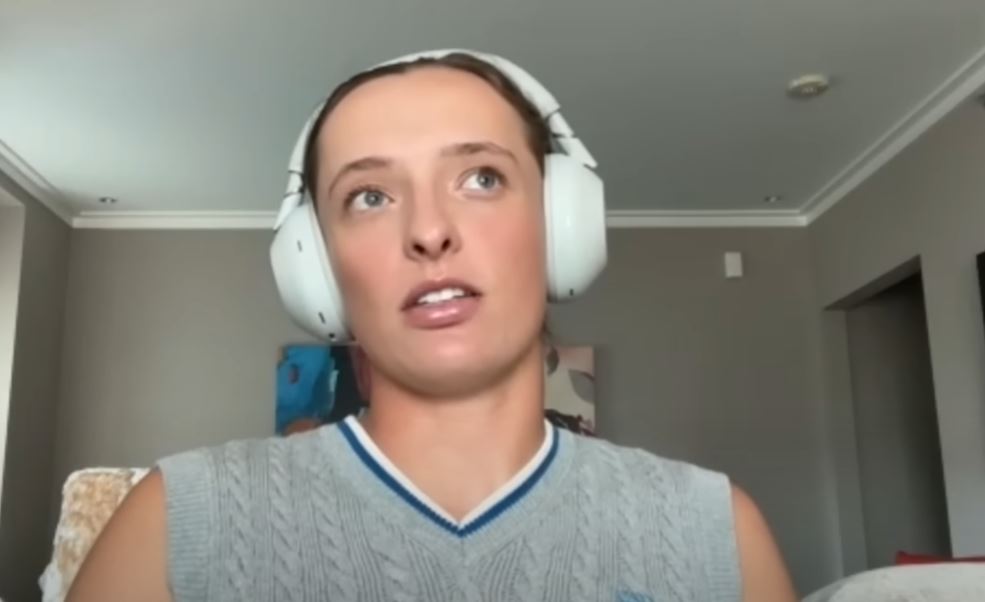The lives and sacrifices of Iga Swiatek’s parents, Tomasz and Dorota, are fundamental to her incredible achievement on the biggest tennis stages. Their divergent career paths—one in Olympic sports and the other in medicine—gave the young Iga a foundation that was surprisingly successful in molding not only her tennis skills but also her self-disciplined personality.
Tomasz, her father, instilled in his kids the principles he learned from his rowing career. He was an Olympian who competed for Poland in the 1988 Seoul Games, thus he was aware with the highs and lows of professional athletics. He pushed his girls to play individual sports because he thought their futures would be much safer in settings where success was decided by individual ability rather than teamwork. When Iga finally discovered her rhythm on the tennis court following short swim tests, that philosophy—which is based on personal accountability—proved especially helpful.
Iga Swiatek – Parents and Family Background
| Attribute | Details |
|---|---|
| Father | Tomasz Świątek – Former Olympic rower (1988 Seoul Olympics) |
| Mother | Dorota Świątek – Orthodontist, practicing since early 1990s |
| Sibling | Agata Świątek – Dentist, former junior tennis player |
| Parental Influence | Tomasz emphasized athletic discipline, Dorota ensured stability |
| Family Recognition | Tomasz awarded Officer’s Cross of Polonia Restituta (2020); Iga honored with Gold Cross of Merit |
| Relationship | Parents divorced during Iga’s teenage years |
| Support Roles | Tomasz coached Iga until 2024; Dorota financed early tennis years |
| Family Home | Warsaw, Poland |
Dorota, on the other hand, stood for stability via structure and science. Her methodical and patient approach to life as an orthodontist complemented Iga’s training and attitude perfectly. She ensured that resources were available during difficult times by discreetly funding her daughter’s early development. Her effect was particularly evident; Dorota stressed balance and reminded Iga that happiness in her work was just as important as winning, whereas Tomasz encouraged resilience and a zest for competition.
The familial dynamic reflects remarkably similar tales from the history of tennis. Venus and Serena Williams give Richard Williams credit for his unwavering vision, but they also frequently emphasize their mother Oracene’s calming influence. Rafael Nadal frequently discusses his family’s strong anchoring influence. Iga’s parents belong to this family line whose subtle influence is just as significant as official coaching, while having quite different personalities and approaches.
Tomasz once acknowledged that Iga’s journey almost failed due to financial difficulties. At times, he worried that training could have to end completely. However, by enduring those difficult years, the Swiatek family demonstrated an encouraging reality: that family resilience can lead to outcomes that are felt around the world. Iga’s heartfelt homage to her father during her first French Open trophy lift in 2020 demonstrated the extent of her appreciation for those invisible sacrifices.
Even if she is now farther away, Dorota is still a significant character in this tale. There is reportedly little interaction between mother and daughter, as Dorota prefers to watch many of her daughter’s games from a distance. Her presence is not lessened, though. She is a living example of how assistance can be provided in a variety of ways, not always obvious or courtside but yet having a significant influence. Even in complex partnerships, her job exemplifies the more subdued aspects of parental influence: believing, enabling, and funding.
The distinction between generations is further highlighted by the accolade given to Tomasz and Iga at a joint state ceremony in 2020. For his achievements to sports, Tomasz was awarded the Officer’s Cross of the Order of Polonia Restituta, while Iga was awarded the Gold Cross of Merit after winning at Roland Garros. This mutual acknowledgment represented something incredibly resilient—the persistence of Poland’s athletic heritage, transmitted from father to daughter in a manner that was both intensely personal and important to the country.
The most notable aspect of their narrative is how Iga was fashioned differently by each parent. Because she insisted on maintaining her physical discipline, Tomasz developed a very effective mindset that included routines, regularity, and the bravery to persevere when challenges looked insurmountable. Dorota’s composed assistance gave her daughter perspective by demonstrating to her that success meant little without happiness. Iga has been able to adjust not only on clay courts but also on grass and hard surfaces, where she has lifted trophies with poise that belies her age, thanks to the combination of discipline and assurance they produced.
This story touches on a larger social issue. Long before the cameras roll, families are the hidden builders of excellence, fostering ambition and resiliency. The sacrifices made by the Swiatek family are relatable because they reflect many unseen tales of parents who put their kids’ aspirations ahead of their own by working more hours, traveling great distances, and making difficult decisions. Iga’s efforts not only helped her develop a profession but also made her a national hero whose accomplishments serve as an inspiration to a new generation of athletes.
Her orderly rituals are a reflection of her father’s guidance. Her grounded approach is a whisper of her mother’s influence. Her triumphs, each of which is inscribed in tennis history, are evidence of a family that did not allow setbacks to dictate their future. The fundamental theme of Tomasz and Dorota’s narrative is how two distinct strengths—one from the demanding waters of rowing and the other from the cautious hands of medicine—cambined to create a champion who stands for far more than personal achievement.
Looking at it this way, Iga Swiatek’s parents serve as a reminder that there is a family that has supported, sacrificed, and believed behind every ace, every championship, and every record-breaking performance. Raising a tennis champion is only one aspect of their tale; another is molding a person who can bear the burden of expectation with poise, tenacity, and unshakable purpose.



